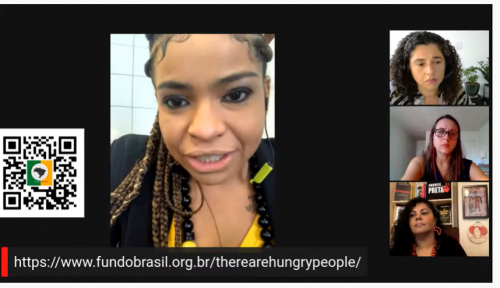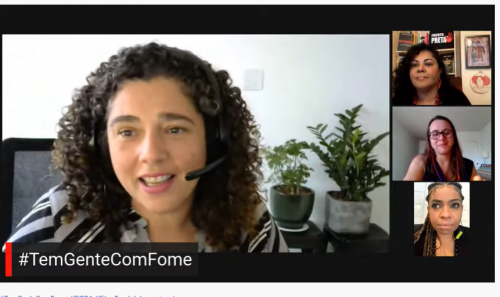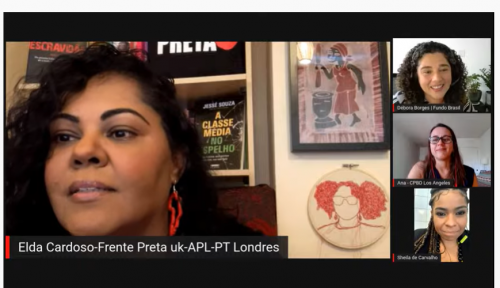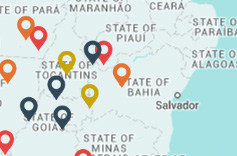Hunger is on the increase in Brazil. A survey carried out by Rede Pessan shows that food insecurity affected around 19 million Brazilians in the past year. Currently, in the country 55.2% of households find themselves in this situation to some extent, light, moderate or serious.
This alarming data is drawing the attention not only of those who are seeing the crisis up close in Brazil but also in other countries around the world where people are watching the news and realising the situation is getting worse each day as a consequence of Covid-19 and the State´s failure to act.
So, Brazilians who are organised in the struggle overseas, in countries like the UK, Holland, Switzerland, Canada, the United States and others, are mobilising to get funds and food for those in need.
Nine international groups – US network for Democracy in Brazil; Frente Internacional Brasileira contra o Golpe e pela Democracia (FIBRA – internacional); Frente Preta UK; Brazil Matters; Coletivo Amsterdam pela Democracia no Brasil; Coletivo Taoca; Coletivo Brasil-Quebec; Coletivo Brasil-Montreal; Coletivo por Um Brasil Democrático – are joining Brazil Human Rights Fund in supporting the campaign People are Hungry, Give Them Food.
The initiative of the Coalizão Negra por Direitos (Black Coalition for Rights), in partnership with a number of movements and civil society organisations, is seeking the funds to feed over 222,895 families, mapped by the organisation, who live in economically vulnerable conditions and face hunger on a daily basis.
Online international mobilisation

Sheila Carvalho speaking about the campaign against hunger, run by the Black Coalition for Rights
On Wednesday 12th, the collectives held an online meeting, on YouTube as part of the publicity for international support. This was to draw the attention of other Brazilians abroad to the scenario of hunger and poverty that is devastating the country.
The conversation was led by Elda Cardoso, an activist and co-founder of the Frente Preta UK, in London, England and Ana Cernov, of the Collective for Democracy in Brazil, in Los Angeles, USA.
Débora Borges, manager for Relationship with Society at Brazil Fund and Sheila Carvalho, articulator at the Black Coalition for Rights, were invited to the presentation. The latter opened her talk highlighting the need to direct the work of the Black Coalition for Rights to meeting the needs of these families.
“Since 2014, Brazil has figured on the UN Hunger Map, but the situation for millions of people who already had very little, got much worse in the pandemic. We knew the black community would suffer greater consequences from Covid-19. And the complaint we heard most from the communities was that of hunger. In light of this situation and the government´s inertia, we launched the campaign in March 2020”, she told participants.
The activist also stressed that sadly, in the current political conjuncture, this situation is far from over. “Hunger was already an issue before the pandemic, but with the death policy we are currently experiencing in Brazil, it will continue to be a reality in Brazilian families. This is why we need to continue this action. We have helped 80 thousand families, but many more still need food”.

Débora Borges highlighted the importance of civil society support in ensuring democracy in the country
Débora Borges stressed what civil society support for these initiatives means for the country, at a time like this. “Funds are important in carrying out transformation and attending to emergency problems. But there is a significance that goes far beyond financial issues, because this mobilisation of individuals makes more people understand, recognise, legitimise and validate the work of social organisations in contributing to the work of those working on the frontline of supporting democracy and fighting for human rights”.
The Brazil Fund representative also explained how support for projects and grassroots groups occurs.
“We are an organisation, made up of activists, who do the work of mobilising funds to strengthen this field. We respect the autonomy of the groups because we believe the solution is at the grassroots level and that it lies with those who lead the struggle and accompany it closely. This is a campaign led by the black movement, speaking out about the lack of any public policy, as it sees its own people dying on a daily basis. And if this is the struggle of the Black Coalition who are working on the ground, then this is what Brazil Fund will support”, she concluded.
Ana Cernov, reinforced Débora´s speech and talked about the appeals that have been reaching the collectives outside Brazil to intervene with aid for the nation´s calamities.
“We, who are not in Brazil, are in no doubt that the solutions lie with those who are in the territories tackling these problems. So, from overseas, we have to mobilise to make this cause known. We have been receiving many cries for help outside Brazil. Those who are on the frontlines need our support. Participating in the Black Coalition for Rights´ campaign, with the support of Brazil Fund, is one way of reaching families in all regions of Brazil. We cannot be idle in the face of the situation in our country of origin. We have friends and family there”, she recalled.

Elda Cardoso stressed that hunger is an emergency in Brazil
Elda Cardoso, activist and co-founder of Frente Preta UK, stressed why hunger, among so many other emergencies, is the most important.
“I am a black woman and I ate today and my children ate too. But I am very concerned about the situation facing my sisters in Brazil. When I talk about my sisters, I am talking about the black women who find themselves in the situation of not having bread to feed their children. Hunger is painful. Hunger cannot wait. You cannot wait. This is the most urgent issue today, because when you are hungry, you cannot do anything”, Elda said.
Brazil Fund and the campaign People are Hungry
Brazil Fund´s support for the campaign People are Hungry, Give Them Food, a Black Coalition for Rights campaign, aims to act as a bridge between donors and this fundamental humanitarian action, during the Covid-19 pandemic. The disease has left a trail of hunger, poverty and ongoing human rights violations in the most vulnerable communities.
All donations are directed to the campaign that will distribute food and hygiene and cleaning items to over 222,895 families in all regions of Brazil.
For further information, click here to watch the campaign video.







